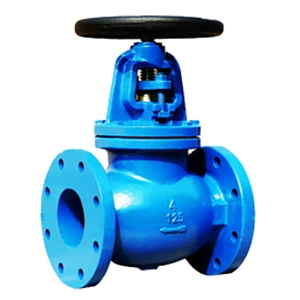The connection between the valve diameter & the medium's velocity
Posted: 09/26/2018 10:25:15 Hits: 93
The flow rate and flow velocity of a valve mainly depend on its diameter, as well as factors like the resistance of its structure against the medium. Meanwhile, they are also related to, but not limited to the valve's pressure, temperature, and the density of the medium.
Q (flow rate) = Av (area × velocity)
When the velocity of a medium is relatively high, the area, which associates with the diameter of the valve, can be smaller. But this will also cause the increase of energy loss due to friction, and great damage to valve. Aside from that, static electricity generated by a flammable and combustible medium in fast velocity is dangerous as well. So a high-viscosity and combustible medium is supposed to be in a relatively low velocity, (Setting extremely low velocity is neither operationally nor economically efficient.) which is generally set to 0.1-2m/s depending on the medium's viscosity.
Normally, the nominal diameter of a valve is calculable since the flow rate is known and the velocity can be determined by experience.
The resistance of flow will change according to the structure pattern of valves, even the diameter remains the same. With the resistance coefficient of the valve increasing, the velocity and rate of flow will decrease accordantly under the same conditions.
| Fluid |
Conditions |
Flow Velocity (m/s) |
| Saturated Vapor |
DN>200 |
30~40 |
| DN=200~100 |
25~35 |
| DN<100 |
15~30 |
| Superheated Steam |
DN>200 |
40~60 |
| |
DN=200~100 |
30~50 |
| |
DN<100 |
20~40 |
| Low Pressure Steam |
ρ<1.0 (AP) |
15~20 |
| Medium Pressure Steam |
Ρ=1.0~4.0 (AP) |
20~40 |
| High Pressure Steam |
Ρ=4.0~12.0 (AP) |
40~60 |
| Compressesd Gases |
Vacuum |
5~10 |
| Ρ≤0.3 (GP) |
8~12 |
| Ρ=0.3~0.6 (GP) |
10~20 |
| Ρ=0.6~1.0 (GP) |
10~15 |
| Ρ=1.0~2.0 (GP) |
8~12 |
| Ρ=2.0~3.0 (GP) |
3~6 |
| Ρ=3.0~30.0 (GP) |
0.5~3 |
| Oxygen |
Ρ=0~0.05 (GP) |
5~10 |
| Ρ=0.05~0.6 (GP) |
7~8 |
| Ρ=0.6~1.0 (GP) |
4~6 |
| Ρ=1.0~2.0 (GP) |
4~5 |
| Ρ=2.0~3.0 (GP) |
3~4 |
| Gas |
|
2.5~15 |
| Semiwater Gas |
Ρ=0.1~0.15 (GP) |
10~15 |
| Natural Gas |
|
30 |
| Nitrogen(gas) |
Ρ=5~10 (AP) |
15~25 |
| Ammonia(gas) |
Vacuum |
15~25 |
| Ρ<0.3 (GP) |
8~15 |
| Ρ<0.6 (GP) |
10~20 |
| Ρ≤2 (GP) |
3~8 |
| Liquid Acetylene |
|
30 |
| |
5~6 |
| Acetylene Gas |
ρ<0.01 (GP) |
3~4 |
| ρ<0.15 (GP) |
4~8 |
| ρ<2.5 (GP) |
5 |
| Chlorine |
Gas |
10~25 |
| Liquid |
1.6 |
| Hydrogen Chloride |
Gas |
20 |
| Liquid |
1.5 |
| Liquid Ammonia |
Vacuum |
0.05~0.3 |
| Ρ≤0.6 (GP) |
0.3~0.8 |
| Ρ≤2.0 (GP) |
0.8~1.5 |
| Caustic Soda |
Concentration 0~30% |
2 |
| Concentration 30%~505 |
1.5 |
| Concentration 50%~73% |
1.2 |
| Sulfuric Acid |
Concentration 88%~93% |
1.2 |
| Concentration 93%~100% |
1.2 |
| Hydrochloric Acid |
|
1.5 |
| Water and Other Liquids with Similar Viscosity |
Ρ=0.1~0.3 (GP) |
0.5~2 |
| Ρ≤1.0 (GP) |
0.5~3 |
| Ρ≤8.0 (GP) |
2~3 |
| Ρ≤20~30 (GP) |
2~3.5 |
| District Heating Circulating Water, Cooling Water |
0.3~1 |
| Pressurized Water Systems |
0.5~2 |
| Non-Pressurized Pipe Systems |
0.5~1.2 |
| Tap Water |
Main Pipe Ρ=0.3 (GP) |
1.5~3.5 |
| Branch Pipe Ρ=0.3 (GP) |
1~1.5 |
| Boiler Feedwater |
|
>3 |
| Steam Condensate |
|
0.5~1.5 |
| Condensed Water |
Artesian |
0.2~0.5 |
| Superheated Water |
|
2 |
| Seawater, Brackish Water |
Ρ<0.6 (GP) |
1.5~2.5 |
NOTE:
1.DN(mm), P(MPa)
2.The resistance coefficient of gate valves is within the scope of 0.1-1.5, of which valves with large diameter have smaller coefficients (0.2-0.5). (full gear)
3.The scope of the resistance coefficient of other valves (full gear):
Globe valves: 4-7,
Y-pattern globe valves (straight pattern): 1.5-2;
Forged steel globe valves: up to 8;
Check valves: according to the structure pattern,
Swing check valves: 0.8-2 generally, (while that of multi-disc swing check valve is relatively high.)
Lift check valves: up to 12;
Plug valves: 0.4-1.2;
Diaphragm valves: roughly 2.3;
Butterfly valves: within 0.5 (generally)
Ball valves: around 0.1
4.The diameter you should choose ≈ The calculated diameter ÷ 85%

